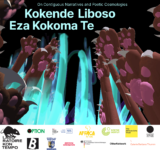Image Credit: Crazy nook (via shutterstock)
Translated from the French by Nchanji M. Njamnsi and Nfor E. Njinyoh
cliquez ici pour lire la version en français
The country is anaemic, I’m told
Its blood drained by vampires
We will be parted from it soon
By the curtain of shadows
— Géraldin Mpesse
“Out of the way, you rascals!” the Rector’s bodyguard bellowed, pushing back the crowd with his right arm. He opened the door of the big, black Prado and the university boss alighted. The man oozed condescension; not a single student had been granted audience since he was propelled to the position by decree. He slipped on his grey jacket, adjusted his red tie, and stepped into the hallway of his office building. Ruben, the president of le Parlement, the students’ union, followed behind him, shouting: “Our letter, Monsieur le Recteur!” A security guard shoved him and hit him right in the chest. The sound of the blow rang in my head like the echo of a Bamileke drum. Ruben reeled back, doubled over, panting in pain with one hand clutching his chest. After a while, he stood back up and whistled. In the distance, towards the big football field, a rumble rose, drowned in the cold breeze of that June morning, growing gradually. I climbed up a pole and darted onto a rooftop to see what was happening, but a dense fog shrouded the spectacle. The virus of curiosity emerged, haunting me, sticking to my skin like a Hausa perfume. A swarm of bees, whose provenance and destination I knew not, whizzed past overhead with a disquieting buzz. Panic-stricken, I leapt to the ground.
That’s when I saw them: a forest of students walking up the hill road that stretches past Amphi 502, some carrying placards, others pot lids. “We’ve been forgotten by the Nation… but it’s in the streets that all battles are won,” they sang with melancholy. Over and over, in unison, they chanted the chorus, like a rhapsody of misfortune: “The streets are the pulpit on which the marginalised voice their misery.” The signs they carried bore a message: Mr Rector, history is calling. Think about it. Just like us, you were once a student here… The sun was yet to cast its rays upon Yaounde, but the students were already perspiring profusely. Sitting on a termite mound, I watched the scene with indifference for I had little faith that change could come from men as nonchalant as snails. They looked like the Corpus Christi faithful following the sacramental bread. They would probably be unable to hold their own against the raging guards burning to show Monsieur le Recteur that they were selfless servants and that he was beyond reproach, especially from those ever-discontented students.
Seeing them like this, I considered telling them to stop acting stupid and appealing to pity as though begging for their rights, that tiny creatures crying is sweet music to the ears of predators poised to devour them, and that the world is deaf to shouting and crying. I climbed down from the termite mound and followed them. There was a whistle and, in unison, the students broke into shrieks, compounding the noise with an irritating cacophony of banging cans and pot lids.
I could have kept my distance from the start of this story, the day Ruben went door to door informing our neighbours that frustration had reached its peak, that their hearts were full, and it was now ‘do or die’; Etoudi, the seat of power, had to hear their cry.
Even if they were right, that wasn’t worth risking their lives. And for next to nothing; a Bachelor’s, a Master’s, or a PhD that offered no major prospects. Bloody hell! This was a step too far! Many of them were better off returning to their villages, helping their parents clear banana and cocoa plantations, working themselves to the bone on millet, sorghum or coffee farms.
*
Champi took off his shirt, flaunted his bulging muscles, intimidating students. Seemingly, this was exactly the kind of situation the hefty guard had been awaiting to revenge all those fights he lost in the ring back when he still hoped for a big career in boxing. He stuck out his chest, displaying and flexing his muscles, then pursed his lips and rained blows on a dozen students. But he quickly ran out of breath; he was fifty-six, an age concealed by his enthusiasm for physical exercise and his stout build. Finally, he leaned against the trunk of a pawpaw tree, hands on his knees. As he straightened up, a large stone struck him on the back of his neck…
A siren resonated from Château. I panicked and curled up beneath the Prado. Two huge anti-riot trucks entered the campus at break-neck speed and parked in front of the Rector’s Office. Someone must have tipped them off… Masked police officers jumped out of the trucks, each carrying a riot shield in the left hand, a baton in the right. With a flick of the wrist, one of them pulled out a tear gas canister and sprayed the students on the frontline. They broke rank like a colony of ants pouring out of the earth. Another took a belt to Ruben’s back, slashing open his shirt, the tear exposing the large swelling that had formed almost instantaneously. He stumbled, spluttering, with trails of blood on his chin. His mates swarmed in and whisked him away. A shiver coursed through my body. Indignation simmered within me, whispering that I could do something for these helpless students. Rather, I could do something for us; free us from this misery, orchestrated intentionally by the Rector and the director of University Catering so they could treat themselves to top-of-the-range Fortuners, nights with wolowosses in luxury hotels in Kribi, and designer suits from Gucci and Kenzo.
I took a big leap, landed on a flower bed and blinded the bastard of a police officer with a single spurt of saliva.
“My eyes!” he yelled, collapsing. I wanted to give up, scared I would be shot in the head. Then I remembered: victory follows only in the wake of struggle.
Ruben and I had left Etam-Bafia in October and moved into the university hostel to enjoy meals in the Restaurant. At Etam-Bafia, I had lived on leftovers from Zang, our neighbour—a retired soldier.
The announcement of this move had stirred something within me, as if I’d broken the chains of misery holding me captive in that filthy, nauseous slum. Yes, the misery in Etam-Bafia was as legendary as the opulence in Bastos. I immediately thought Ruben had landed a job; I had no real idea of what Cité U was. The name evoked images of tarred streets lined with high fences crowned by barbed wire, which enclosed villas and castles covered by thick, lush greenery. At the time, the move made me feel like a poor man’s son adopted by a rich man.
We arrived in Cité U on 14 October, taking up room A14. I finally realised that ‘Cité U’ referred to the university hostel. A feeling of desolation descended upon me, but living here turned out to be worthwhile. For the first time, I lived in a place with a proper floor and walls made of concrete blocks, surrounded by items I couldn’t name.
The first word I learnt was ‘closet’, because my roommate would often keep food in it for me. On the rattan shelving opposite the bed, there was a gas cooker Ruben had bought from Artur, a teacher who had been transferred to Ngarigombo as part of his recruitment into public service. A useless purchase; never had I ever seen a single flame in that room.
*
The certainty of defeat loomed over the foolhardy students still standing up to the police. They watched their schoolmates writhing in pain; fractured arms, broken teeth, battered faces.
I decided to head home.
How could anyone continue living in this deathly place? A deathly place where grass grows brazenly, even at the entrance to the University Restaurant? A Restaurant where sprawling mould ate away at the walls, leaving them looking leprous? I crossed the yard, as though in a waking dream, reliving scenes of these students pushing and shoving one another in queues. I would go there every afternoon and evening to feast on pieces of fish, morsels of bread, grains of rice stuck to the plate of a student who hadn’t finished their food, either out of pride or lack of appetite. I relished it.
God is merciful! Walking across the yard, I came upon an avocado. Whilst enjoying it, I heard a scream of agony a dozen metres away. Was that man or beast? A breeze blew, bending the shrubs. I saw a man in the bushes, dressed in khaki. He was definitely a police officer. I cleaned my lips with a lick of the tongue and rushed to respond to the scream.
The police officer was strangling Awulu, our neighbour from room D14. The student could barely breathe. His eyes were bulging from their sockets. Strangely enough, not a single tear ran down his cheeks. Yet you could see from his agitation that the pain had reached its peak. The scene was awful, reminiscent of a pig singing its swan song in the hands of a butcher. My blood ran cold. The police officer let go of him. He breathed in deeply, coughing repeatedly, then tried to escape, but the officer pinned him against the handrail and kicked him in the back.
“Loser, what year are you in?”
Awulu stayed mute. He continued inhaling and exhaling like a dying man awaiting the anointing of the sick.
“I am talking to you, idiot! Are you dumb?” he barked. The student swallowed twice.
“I am… I am… in year four, sir,” he quivered.
The police officer took a packet of cigarettes from one of his pockets while crushing the victim’s thigh with his huge black boot. He pulled out a cigarette, lit it, took a drag and, several seconds later, blew thick smoke into the air. Then he produced a sachet of King Arthur whisky from the same pocket, tore it open with his teeth and emptied the contents in one gulp. Out of the corner of his eye, Awulu looked at him, as if wanting to ask for the cigarette butt.
“Young man, all is fair in war. Do you hear me? Until you become a DO, an SDO or a governor with those certificates of yours, I will discipline you. Repeat after me. It’s not that hard. Let’s go: A degree is no match for a First School. Repeat!”
Awulu cast a scornful look at the officer, who slapped him so hard that he left an imprint on the student’s face. Two trails of tears trickled down from his eyes to stagnate on his upper lip. The police officer wouldn’t give up.
“First School pass Degree. Repeat!” he ordered once more. The term ‘First School’ did not seem to be part of Awulu’s vocabulary. He refused to talk.
I circled them, approaching stealthily. As I hid behind a mango tree opposite the police officer, I rustled the dead leaves beneath with my feet. When he looked up, I pounced and spat into his eyes. He went blind there and then. I took to the hills.
A police officer lurking behind a palm tree, finger on the trigger, called out to a passing colleague.
“The time has come, oh, my brother! It’s time to take it to the next level! I’m dying to squeeze a young student’s breasts like a sponge and feel her nipples harden.”
His colleague kept mum, ignored him, and moved along.
“For crying out loud! Have you ever seen a massacre without rape? You’re nothing but a bloody traitor!” he barked, leaving his hiding place.
Then he ran off.
I followed.
He wandered the campus for a while, but could not see even the shadow of a female student. Finally, he spotted women’s clothing hanging on a saggy washing line outside the second floor of block D. With his gun slung across his shoulder, he ran up the stairs like a desperate drug addict and twice kicked the door to room D24. The hinges came off, ripping the door from its frame. He rushed into the room. But there was no one inside.
He rubbed his crotch and a bulge immediately formed beneath his zipper. With the back of his hand, he knocked off the make-up box from the windowsill, scattered the papers on the table, then emptied a bottle of vegetable oil out of the window. His eyes scanned the room and landed on the bed. Upon it, there were a pair of undies and a towel. He moved his weapon to his back, picked up the undies and took them to his nose, smelling them piously like a priest kissing the corporal. Holding it above his head, he examined them as though he was trying to locate something. What could that be? Period stains? Vaginal discharge? Hiding behind the door, I watched his every move, curious what this pervert would do.
He placed the undies back on the bed, unzipped his flies, then grabbed the underwear again and started rubbing his huge, crooked cock against the panel that covers the vagina. His grunt of relief came rather quickly. I was taken aback by such behaviour; acting like a sex-starved nutcase when he had a ring on his left finger. The officer tucked his penis back in place, then hurled himself onto the small bed with the full force of his weight. He lay there for a long while, motionless. I thought he was dead. But then he sprang to life noisily, wiping his face while staring at the floor in front of him. His gaze tarried on Jesus, nailed to a small, wooden, weevil-eaten cross hanging on the wall. Something told me to use my secret weapon against him, but I held back.
He opened the small fridge, grabbed a half-drunk bottle of juice, swigged it all down, and then left; he had the look of a soldier who had accomplished his mission. One man’s pain is another man’s gain, I thought to myself as I came out of hiding to grab the packet of mbounga sitting on the shelf. I devoured it in a flash. As I left the room, I had no idea which way the officer had gone. But the silence had been broken by coughing just moments before. Had he gone hunting for other prey?
The mbounga had left me unsatiated. As I circled the building, seeking any form of sustenance, I thought I heard Ruben’s voice. I rushed to our room. Unfortunately, it was empty! It was all in my head.
Was he still alive? I knew him to be a fighter, resilient.
As if responding to a call, I climbed up the hill overlooking the Obili lake. At the top, some fellows were scanning the campus; notepads, recorders, and cameras in hand. Journalists. The man who looked like the boss seemed angry.
“Dammit!” he exclaimed, shaking his head. “I was told students were wrecking the amphitheatres!”
Hidden in the bushes, I fell asleep.
When I woke up, it was nightfall. I headed to Obili for supper, to the street littered with off-licences, grilled food and roasted fish. As I turned onto the street, a radio journalist’s voice droned on through speakers outside a shop-cum-off-licence. The police had taught the school-wrecking students a lesson, he reported. A drunkard who had been listening blurted out: “These big book people are troublesome. They complain too much. Who do they think has it better in this country? Eh? Since Ahidjo left, we’ve only just been managing. How man go do?” The people around agreed.
At Mirador, customers were gyrating between tables. Their dancing moves hinted at drowned morning sorrows. I entered the bar; I had spotted a plate of chicken abandoned beneath a table. Deftly dodging their busy legs, I reached my target and snatched a partly eaten drumstick, licking the spices that dripped from it as I chewed. All of a sudden the music stopped playing and I heard the 8 o’clock news jingle. I dropped the bone I was clenching with my teeth. The first journalist read the headlines. Then the second announced the presidential decree in a clear, reassuring voice: “As of the date upon which this decree is signed, Mr Issoplo Pierre, Full Professor, previously in service at the Ministry of Higher Education, is hereby appointed Rector of the University of Yaounde I, replacing Mr Minale Paul, who is relieved of his duties.”
I meowed with joy. Someone noticed me. Kicking at me angrily, he shouted: “Since when are cats welcome in this bar?”
I pounced, fur bristled, poised to spit.
“Spittle Royale” is from Your Feet Will Lead You Where Your Heart Is






